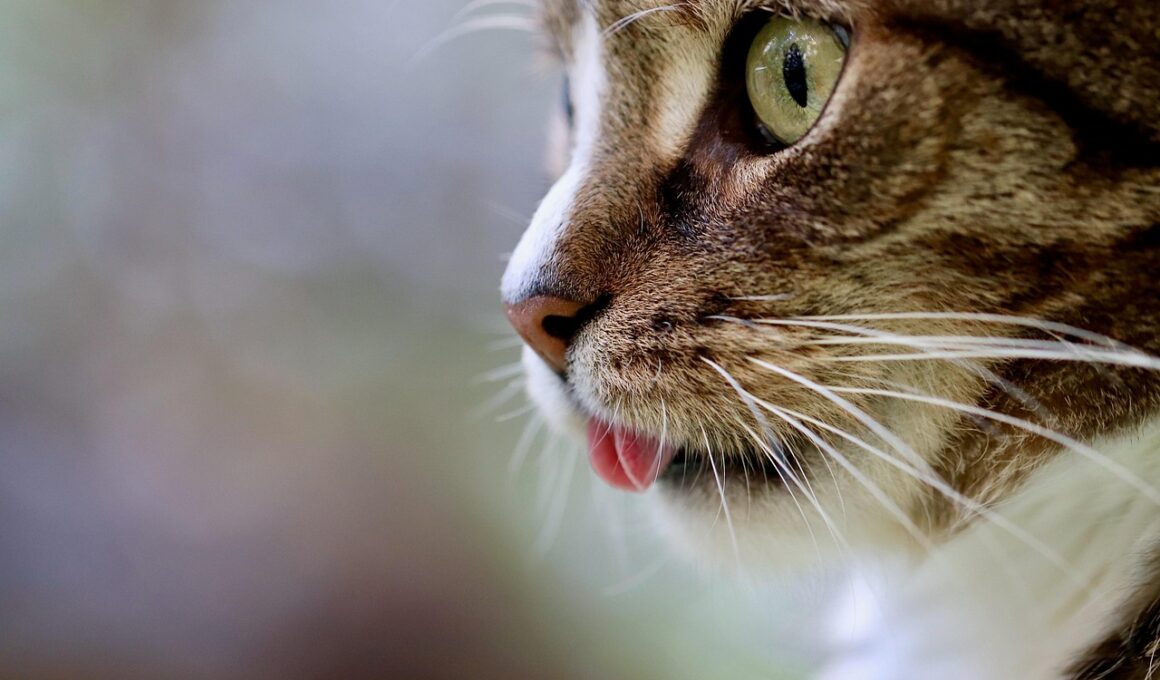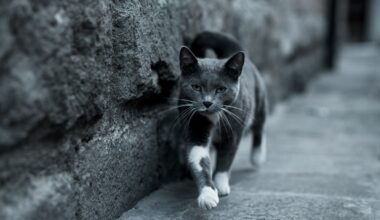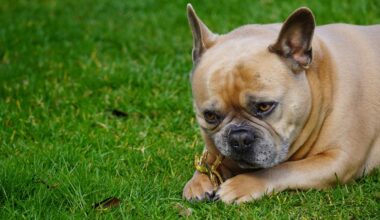How to Safely Incorporate Herbal Supplements into Your Cat’s Diet
Herbal supplements can offer various health benefits for cats, but ensuring their safe incorporation into a cat’s diet is essential. Cats possess unique digestive systems, which are different from humans. Before introducing any supplement, conduct thorough research on the specific herb and consult your veterinarian. Key factors that should be confirmed include the herb’s safety, potential side effects, and correct dosage. Certain herbs could have adverse interactions with medications your cat may already be taking. Always prioritizing safety can help avoid potential health crises. Additionally, understanding the motivations behind using herbal supplements is crucial. Focus on improving your cat’s quality of life or addressing specific health issues. For instance, if your cat has anxiety, herbs like chamomile or valerian may be suitable. Researching and understanding the specific ailments enables you to choose the most appropriate herbs. This makes the supplement regimen more effective. Always adjust your approach according to your cat’s reactions to the supplements as they may experience different effects. Continually monitor your pet’s health and behavior for the best results.
Transitioning to herbal supplements should be a gradual process for your cat. Even if a particular herb is deemed safe, a slow introduction allows your cat to adapt better to new dietary changes. Start with tiny amounts of the herbal supplement and gradually increase the dosage over time. Keep a close eye on your cat’s reactions, as they may display signs of gastrointestinal upset or allergies when trying out a new supplement. It’s important to limit any new herb to earlier portions of your cat’s diet to observe any changes that occur. Introducing one new supplement at a time is also beneficial. This way, you can isolate any negative reactions to determine which specific herb might be causing a problem. Furthermore, ensuring that the source of the herbal supplements is reputable will help guarantee their quality and safety. High-quality, organic herbs reduce the risk of contamination with harmful substances. Always read labels and package information carefully to understand where your supplements originate. Consulting with a veterinarian can also help you find trusted brands and herbal blends for your cat’s health needs.
Identifying the Right Herbal Supplements
Identifying the right blend of herbal supplements for your cat involves considering their individual health needs and condition. Not all cats are the same, so there is no one-size-fits-all solution when it comes to herbal supplementation. Some common herbs that may benefit cats include milk thistle, which supports liver health, and dandelion, which aids digestion. Additionally, ginger may assist in alleviating nausea, making it ideal for cats that struggle during car rides or vet visits. Always do thorough research on each herb’s properties to ensure their suitability for your feline friend. Pay close attention to herbal dosage guidelines provided by experts to guarantee optimal results. Some herbs may require a specific combination to serve varied purposes, and consulting a holistic vet can improve your understanding. You may also consider a premium product that incorporates multiple beneficial herbs to provide comprehensive health support. Assessing your cat’s personality traits, habits, and medical history will aid in selecting the most effective herbal supplements suited for their needs. Be patient and attentive as each cat has a unique response to these supplements, necessitating time and observation.
It is crucial to observe any alterations in your cat’s behavior after incorporating herbal supplements into their diet. Monitoring their appetite, energy levels, and general demeanor will provide insights into whether the supplements are beneficial. Changes in litter box habits or any signs of discomfort should also be noted. Post-introduction monitoring should last for several weeks to ensure that your cat does not experience any adverse reactions or side effects. If any concerns arise, revert to your veterinarian and discuss alternative approaches. Do not hesitate to discontinue the use of herbal supplements if you notice consistent negative reactions. Your veterinarian may suggest less potent alternatives or modifications to the dosage. Additionally, consider supplementing with high-quality cat food that contains essential nutrients and probiotics. Proper nutrition is vital in supporting your cat’s health alongside any herbal supplements. In tandem with consultations with your vet, ensuring that your feline friend maintains a well-rounded diet is essential for optimal results. Regular check-ups will help you assess the overall health of your cat and determine needed adjustments to their supplementation regimen.
Potential Risks and Precautions
Before introducing any herbal supplements into your cat’s diet, identifying the potential risks is essential. Herbal products vary significantly in quality, purity, and dosage guidelines, resulting in inconsistent efficacy and safety. Hence, relying on trusted brands only will mitigate possible health hazards related to herbal supplements. Additionally, cats can react unpredictably to certain herbs, emphasizing the need for caution. Always read product labels and reviews, and ensure the herbs have been tested on cats specifically. Some herbs may not be suitable for pets with certain medical conditions or those on specific medications. Always keep your veterinarian informed regarding any herbal supplements your cat may consume. Furthermore, it is crucial to account for your cat’s weight, age, and specific health requirements when determining the appropriate dosage of herbs. Over-supplementation can lead to toxicity, resulting in severe health implications. Seek veterinary guidance to aid in determining safe and effective dosages tailored to your cat’s unique needs. This involves studying how different herbs interact with one another as well, which helps ensure that your cat remains safe and healthy while using herbal supplements.
When incorporating herbal supplements into your cat’s diet, maintaining a balance between herbal support and traditional veterinary care is essential. While herbal remedies can certainly provide benefits, they are not replacements for professional veterinary treatments, especially in serious health issues. Always prioritize ongoing communication with your veterinarian, particularly if your cat has existing health problems. Open dialogue about your goals for incorporating herbal supplements can foster collaborative decision-making regarding your pet’s overall treatment plan. Through veterinary consultations, you can align your herbal supplementation with your pet’s medications seamlessly. This approach allows you to better regulate their health without compromising their wellbeing. Furthermore, consider keeping a health diary to track your cat’s progress and reactions to the introduced supplements. Taking detailed notes applies great value during consultations and may help your vet recommend specific herbal solutions tailored for your pet. Emphasizing the importance of collaboration with your veterinarian enhances your ability to create balanced and beneficial herbal supplementation strategies for your beloved pet, ensuring that their health remains stable and improving over time.
Conclusion and Final Thoughts
In conclusion, incorporating herbal supplements into your cat’s diet can provide numerous health benefits when done safely and thoughtfully. By prioritizing your cat’s unique needs, maintaining open communication with your veterinarian, and monitoring their reactions, you can harness the power of herbal remedies effectively. Remember to introduce any supplements gradually, paying careful attention to any changes in behavior or health. Keeping a close watch on how your pet responds will enable you to fine-tune their herbal regimen appropriately. Holistically caring for your cat involves a combination of nourishing food, regular veterinary visits, and potential supplements that address their specific health challenges. Always adhere to recommended dosages and seek professional advice to ensure safety and efficacy. Cats lead happier lives when their comprehensive health is emphasized, which makes proper supplemental care an essential component. By integrating herbal options into your feline friend’s wellness routine, you embrace an alternative yet beneficial avenue for enhancing their quality of life. Take the time to investigate suitable herbs and their applications while ensuring consistent communication with your vet. This combination will lead to a healthier and happier cat.
Regular check-ups and being attentive to your feline friend means great support when considering health and wellbeing. The use of herbal supplements opens doors for a wide range of benefits tailored to suit the specific needs of individual cats. With research, professional guidance, and careful observation, you can safely integrate various options into your pet’s diet. Empower yourself as an informed pet owner and advocate for your cat’s health journey, unlocking the natural healing properties to promote and maintain their physical and mental health. Quality always outweighs quantity when considering supplements – focusing on your cat’s overall condition rather than simply on achieving more options is vital in ensuring their longevity. By embracing a holistic approach to pet care, you can create a harmonious environment in their diet and life. Moving forward, continue to prioritize the safety, comfort, and joy of your cat while exploring herbal supplements that align with natural and cultivated health practices.


